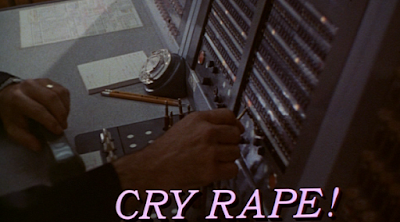Network: CBS
Original Airdate: November 27, 1973
Fresh off of the daytime drama, Love is a Many Splendored Thing, Andrea Marcovicci took another dramatic turn in the harrowing but flawed Cry Rape, which predates the better known (and, frankly, better made) A Case of Rape by mere months. In Cry Rape, Marcovicci is Betty Jenner, an unassuming young woman who comes home from a normal day at work and is attacked by a serial rapist. Mustering up the energy to follow up the assault with police action, Betty is run through a system that seeks to continually victimize the victim. After a man is apprehended, more women step forward, but as the trial and investigation continues it becomes apparent that these women have wrongly accused the defendant.
 |
| Novelization for Cry Rape |
In the end, I had very mixed feelings about the way the film played out. I appreciate the effort to bring attention to a sensitive topic that absolutely needed addressing. However, disregarding Betty for more than half of the film is troubling. It reminds me of 1976’s Revenge for a Rape with Mike Connors. In Revenge, the assault takes a backseat to the heady action scene at the end, which features Connors, not the victim, "getting revenge" (and, if memory serves, has a similar twist). With this approach, the survivor is put under question when it’s revealed that she accused the wrong man. In both of these films, rape is merely a plot device.
At the same time, I did like the ending of Cry because it doesn’t just pat Betty on the back and assume life will resume some kind of normalcy for her. In this respect, it is reminiscent of Are You in the House Alone?, which does a better of job of telegraphing that notion, and, of course, that telefilm is told from the female’s point of view, giving it a gravitas and a sense of realism that Cry lacks.
This is not to say that Cry Rape should be completely disregarded. It’s a very watchable telefilm, with great acting, especially from Peter Coffield and Joseph Sirola (who I know best from his many appearances on Quincy). As a mystery film, it does have its intrigue, and it is an efficient, and sometimes energetic entry into the early days of the telefilm. Mostly though it is an important cultural artifact, because it got to the gate first, and made an honest attempt to depict the horrors of sexual assault. The scenes with Betty are harrowing, and I appreciate that the script makes sure that not every male character is a jerk. It also invites us (all to briefly though) into another survivor’s life, and manages to give viewers something to think about. I just wish those moments were longer, and the mystery aspect played down.
Cry Rape is available through Warner Archives!





1 comment:
I remember Peter Coffield not just from this, but as the dad in the awful film "Times Square". Unfortunately, he died of AIDS in 1973. Joe Sirola was a great voice over artist, but my senior mind has forgotten the commercials he narrated.
Post a Comment